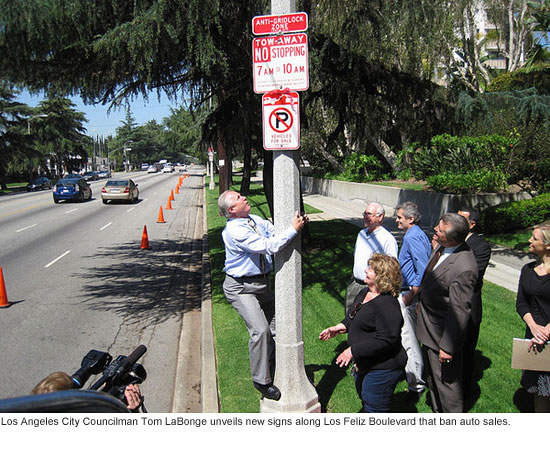Curbside sales hit a roadblock
June 15, 2011
 Parked bumper-to-bumper on busy streets throughout Los Angeles County, they seem to materialize out of nowhere, lines of used cars with hand-lettered “for sale” signs in the windows. And while those vehicles may look like a bargain, they can carry a stiff price for the surrounding neighborhoods and beyond.
Parked bumper-to-bumper on busy streets throughout Los Angeles County, they seem to materialize out of nowhere, lines of used cars with hand-lettered “for sale” signs in the windows. And while those vehicles may look like a bargain, they can carry a stiff price for the surrounding neighborhoods and beyond.
A study by the DMV in Los Angeles last year concluded that, among other things, these curbside auto bazaars have led to hazardous traffic jams, increased pollution and rampant consumer fraud, including the sale of stolen cars with fake paperwork. In some cases, individual sellers were found to be illegally hawking multiple cars, turning the public streets into their personal lots.
On Tuesday, armed with that assessment, the Board of Supervisors decided to slam on the brakes, giving initial approval to an ordinance introduced by Supervisor Gloria Molina that would ban vehicle sales on nearly 1,000 specific blocks in the county’s unincorporated areas. A second and final vote is scheduled for next week.
The board’s action comes one month after the City of Los Angeles, led by City Councilman Tom LaBonge, banned auto sales along Los Feliz Boulevard and Franklin Avenue near Griffith Park, where the car trade has long flourished on weekends.
Helping lead the enforcement strategy was lawyer Sari Steel of the County Counsel’s Office, who worked closely with city and county officials, as well as with the DMV and law enforcement. “Their days are numbered,” she says of the outlaw sellers.
For years, both the county and city had laws broadly banning vehicle sales on public streets. But more than a decade ago, Steel says, the city’s measure was successfully challenged in federal court as an unconstitutional infringement on commercial free speech, prompting the county to stop enforcing a similar ordinance. The speech in question: the “for sale” signs.
In recent years, Steel says, a reexamination of state vehicle codes and other court decisions gave way to a new enforcement strategy, one targeting specific streets where it can be determined that a substantial government interest is at stake, such as neighborhood safety. The county’s proposed new ordinance hits sellers hard in the pocketbook; if they’re caught twice in a restricted area within 30 days, their cars are impounded and penalties are imposed.
Steel acknowledges one potential shortcoming to the approach: some determined sellers may simply move from one of the 78 streets listed in the ordinance to set up shop elsewhere. And on Tuesday, that possibility clearly was on Supervisor Don Knabe’s mind.
“My feeling is that you’re either all in or you’re all out,” an irritated Knabe declared. He argued that a sales ban on certain streets would do nothing to solve a problem that he described as endemic in his district. As for the potential unconstitutionality of a countywide prohibition, the supervisor said bluntly: “Why don’t we let somebody sue us and find that out for a fact.”
Knabe also said he was bothered by the cost of putting up enforcement signs in the restricted areas, estimated at $400,000 by the county’s public works department. The board approved a motion by Knabe for a report in 30 days on the ordinance’s costs and approach.
For her part, Steel remains optimistic, noting that new streets can be added to ordinance in the months and years ahead. “No, I’m not satisfied yet but I’m happy that there’s finally progress…Our enforcement is going to make it inconvenient for the sellers no matter where they set up.”
Posted 6/15/11












 405 bridge work causes a stink
405 bridge work causes a stink
